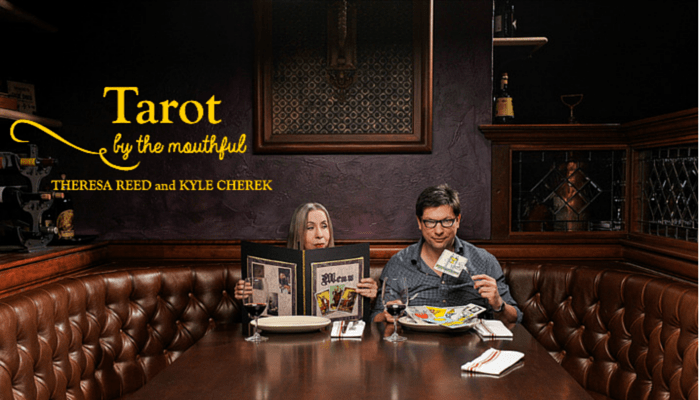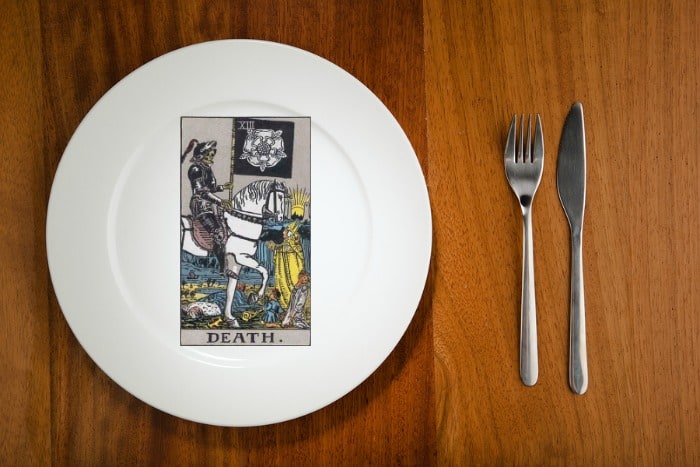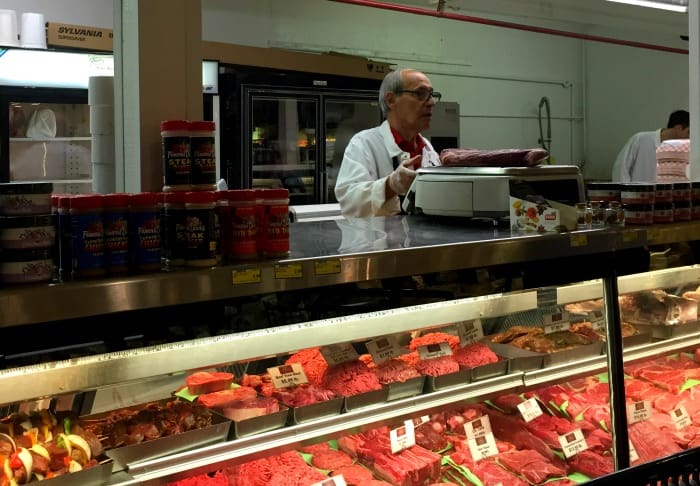Kyle is a foodie who loves Tarot. Theresa is a Tarot reader who loves food.
Together, we host Tarot by the Mouthful: a mouthwatering, multi-media culinary tour through the world of Tarot.
Sublime recipes. Soulful stories. Essays, videos, interviews and delicious surprises.
Join us every Sunday for a new installment — and get ready to sip, slurp, crunch and savor your way through the entire Tarot deck!
This week: Death
Death: Death is the mark of ending, the decay and destruction that must happen for new life to take place. This is transformation. Tear down the old and the outworn to prepare for growth. Change is ahead and it must be welcomed, not feared. Let go and trust that change is not only inevitable but necessary. Out with the old, in with the new. How are you embracing change?
Kyle – Every exit is an entrance
One of my favorite expressions is in fact a quote from a play by Tom Stoppard, Rosencrantz and Guildenstern Are Dead. When it first hit the stage, some dubbed it a continuation of Samuel Beckett’s Waiting for Godot. The statement which I love to quote from Stoppard’s play is a simple one, “Every exit is an entrance somewhere else”.
Elegant and to the point, it came to mind when I was tasked with writing about the Death card for this installment of Tarot by the Mouthful. For Stoppard, or anyone in theater, the line is both a practical stage direction statement, and a metaphor for life and death, change of any distinctive consequence, and as I see it, a hopeful consideration as things in our lives transition, to, both the literal and figurative, next scenes.
In the world of chefs and restaurants, there is an aphorism, that, as restaurateur or head chef, “you are always training someone to leave”. The craft of cooking is only ever begun at, or near the bottom. The lowest of positions in the kitchen as dishwasher, vegetable peeler, etc., are where nearly every chef begins. They may have a leg up on a better post after some training in culinary school, but still more than likely the first job post schooling is line cook or lower.
Advancement comes from attention to detail, repetition of skills, talent, near endless hours of commitment, and the seizing of opportunity when presented. Along that path, often, a cook or chef has to leave their present restaurant employment to move ahead. Hence, the expression.
Many of my favorite chefs are the ones who seek death metaphorically. Once comfortable in a cooking style, kitchen position, or skillset, they leave, and throw themselves headlong into a new style of cuisine in which they are again the lowest in the kitchen, the novice, the newborn in their own personal life and death cycle of improving themselves and their contributions to the craft. Every exit, an entrance somewhere else.
The Death card is full of absolutes. All of humanity bows to the death rider on it’s horse, carrying it’s flag decorated with the symbols of Nothingness and Purity, it’s armor is one of invincibility. We all must exit with it, to enter somewhere else. Cook or king, we need only see the other scene waiting to played out, when the card comes up in our spread.
Theresa: Death is a Sacred Act
I am an unapologetic carnivore.
There. I said it.
A yogi and a meat eater? Yup. And I’ve had fellow yoga lovers shun me when they found out about my carnivorous ways.
I’ve gone through periods as a vegetarian but I always seem to feel better when I eat a little meat. Maybe there is some truth to that “blood type diet” (I’m type O – the kind that supposed to be more carnivorous) or perhaps it’s just because I grew up in a meat-eating family and it was always on the menu.
When I was a kid, my father and brothers would often go hunting. Not big game, just rabbits and squirrels. We ate a lot of them over the years.
I remember dad bringing them home and skinning them on the back porch. Most of the time, I would ignore it but, on occasion, I would watch, fascinated as he pulled their furs off and carefully butchered them.
As an adult, I have also butchered chickens and geese (rural life, yo!). It’s a messy job but doing it yourself makes you appreciate the sacrifice that the animal makes – and how much work it is for those who butcher professionally.
For most of us, we won’t ever know what it feels like to take a life for our sustenance. That’s because the food we eat is usually carefully processed and packaged for us. We have no attachment to the path from farm to table. We have no idea what that animal even looked like, how they lived or how the butcher handled them. We’re completely oblivious. And maybe that helps us to somehow disengage and not feel bad.
Which is why I believe that anyone who decides to eat meat or fish should actually try to engage in the process of finding, raising, and butchering their own food at least once. This will help to understand how it much energy it takes from both the animal and the person who transforms it into food after it dies.
Some people do just that – or they visit a slaughterhouse – and never touch meat again. And then there are those like me, who engage in the process, understand the sacrifice made, and treat the meat with respect. When you take a life in your own hands, you get a completely different perspective. It’s hard to take your food for granted when you’ve been the one who takes the life force away.
Death is sacred. And sometimes, it’s not pretty. But it is a part of our every day life – right on our plates.
Tips for buying good meat:
I don’t buy prepackaged meat. I always visit the butcher instead. This way, I guarantee my meat is fresh and not sitting around for god knows how long.
Get to know your butcher (pictured above: that’s one of my favorite guys, Germano the butcher at the local market!). That is important. Establish a relationship with the person who handles your food and find out how they work. Are they clean? Do they have a firm knowledge of how to prepare the meat? Can they tell you where the animals come from and how they were raised?
Make sure the meat has a USDA grade. This will ensure the meat is of good quality.
Examine the meat carefully. Does it have a good color? Does it smell funny? Trust your eyes and nose!
Avoid frozen meat and marinated meat. Why? Frozen meat can carry bacteria and so can marinated meat. You’re better off making your own marinade at home.
Looking to butcher your own? I love this site on farm life which has some pretty good info on butchering and raising animals: The Elliot Homestead. These people are really solid examples of a good homestead + family life.
Bon appetit,
Theresa and Kyle
photos from personal collection and Jessica Kaminski
Hungry for more? Click here to explore the entire Tarot by the Mouthful series, from the very first card… right up to our latest installment. Bon appetit!




 I’m Theresa Reed (aka, The Tarot Lady). I’ve been a full-time tarot reader for 30+ years — which, in my industry, makes me pretty badass.
I’m definitely not your average Tarot expert — I drop the F-bomb, I quote rappers, and I’m obsessed with pop culture + reality TV. Folks come to me for straight-talk + tough-love — without the woo-woo fluff.
I’m Theresa Reed (aka, The Tarot Lady). I’ve been a full-time tarot reader for 30+ years — which, in my industry, makes me pretty badass.
I’m definitely not your average Tarot expert — I drop the F-bomb, I quote rappers, and I’m obsessed with pop culture + reality TV. Folks come to me for straight-talk + tough-love — without the woo-woo fluff.
You must be logged in to post a comment.